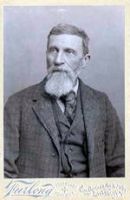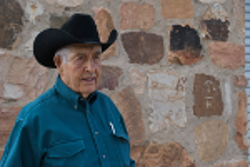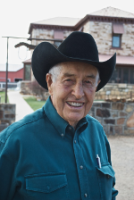




For 160 years the Hashknife Ranch has been operated by the same family.
The ranch has seen many uses in its time, from a trading post along the Santa Fe Trail, to a farm producing crops such as wheat and oats, to its current status as a day-to-day Quarter Horse operation producing show and ranch horses.
William Kronig, the ranch's founder, emigrated from Germany in 1847 and, after a series of enterprises, found himself in New Mexico as a part of the westward movement to California. Circumstances would prevent him from continuing on to the gold coast, and he enlisted with the U.S. Cavalry, which was operating in the northern New Mexico and southern Colorado region under Colonel Benjamin L. Beall. Kronig was a master linguist and, in just a short time in America, had picked up the English language with ease, making him one of the few who could read and write English in the frontier country and an important asset, evidenced by his additional duty as the Commissary Sergeant. Trusted by Colonel Beall, and being a generally adventurous individual, Kronig was tasked with various covert missions in regard to dealings with the tribes in the area.
Upon finishing his duty, Kronig, by the suggestion and investment of a businessman in Taos, opened a dry goods store in the town of Rio Colorado, in northern New Mexico. With this, Kronig got a foot in the door in the mercantile industry, beginning an adventure that would see him move between New Mexico and Colorado as a trader, rancher and farmer.
Not long after, and less than 10 years passed since emigrating from Germany, Kroening was appointed the administrator of the estate of Alexander Barclay at Watrous, in northern New Mexico. The fort, which was a fort only in name, was located on the Santa Fe Trail and included a trading post and post office. After finding success as a merchant and being interested in acquiring the land surrounding the fort, Kronig purchased the fort and built a productive farm that included irrigation and many man-made lakes.
After further ventures in the area proved fruitful, and not without his share of failures, Kronig built a mansion at Watrous, known as the Phoenix Ranch House, which still stands today as a private residence. As Kronig aged into his sixties he acquired a large swath of land just south of his original purchase, selling the Phoenix Ranch in the process. Intending to build a house on his newly acquired property, he contracted his son-in-law, Frank Meredith Jones, to design and oversee construction. In the end, a house and structure that would serve as a new trading post were completed. Kronig and his wife moved into the house and lived out their days together until he passed in 1900. Today, this house serves as the headquarters of Hashknife Ranch.
Upon Kronig's death, the ranch was left to his son, William Kronig Jr. who, unfortunately, was already suffering from rheumatoid arthritis. This ailment caused him to often be away from the ranch in search of treatment, leaving the day-to-day operations in the hands of others, namely Garnet Meredith "Butch" Jones. Butch was well known in the area as a veterinarian and manager of famous rodeo promoter Tex Austin's ranch in Las Vegas, the Forked Lightning Ranch. He also served as a rodeo judge for Tex Austin's rodeos. During these years the Hashknife Ranch served as more of a farm, growing wheat and oats, and even featured an apple orchard. Eventually, cattle were introduced to the ranch.
Butch's two sons, George Meredith "Dogie" and Charles T. "Charlie", worked the ranch from a young age. Through their education and world events, such as World War II, the boys would venture a long distance from Watrous and the ranch. Even Butch, a veteran of World War I, would often hit the road as a rodeo judge, traveling the major circuits of the day. As a highly regarded judge, Butch would be called upon to serve in rodeos as far away as Las Vegas, New Mexico, New York City, Chicago, and London. No matter the distance, though, they were always drawn back to the ranch.
Butch passed in 1954, having been the trusted steward of Hashknife Ranch in William Kronig Jr's stead. William Jr passed shortly after in 1952, leaving his mother, Maria, as proprietor of the ranch. Dogie, who at this point had served in World War II and had only recently returned from an international effort to eradicate Hoof and Mouth Disease in Mexico, decided to continue the family legacy by leasing the ranch from Maria.
At this turn, Dogie guided the ranch in a new direction by establishing a Quarter Horse operation headquartered at the ranch. Warren Shoemaker, a legendary Quarter Horse breeder and AQHA Hall of Famer, had a big influence on Dogie entering the Quarter Horse industry. Dogie's first stallion was "Mister Cue" out of a Shoemaker mare by the name of "Wyona Cue". In the years that Dogie operated the ranch, he also served on the New Mexico Livestock Board, including six years as Executive Director, and taught leatherwork at nearby New Mexico Highlands University. The ranch remained his passion, however, and Quarter Horses were the heart of the ranch's day-to-day operations, though Dogie also managed interests in Corriente and Red Angus cattle.
Dogie's ability to raise quality livestock was renowned, especially when it came to horses. He was honored as one of the 2005 recipients of the Foy Proctor Memorial Cowman's Award. In 2016, his talent was recognized as he was awarded the American Quarter Horse Association's 50 Year Legacy Award. Shortly thereafter, one of Dogie's stallions, Metallic Gun, became an AQHA VRH champion.
Dogie passed in early 2022, having operated the ranch for 70 years.

